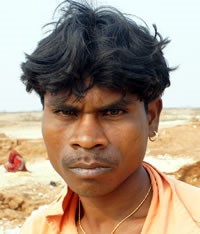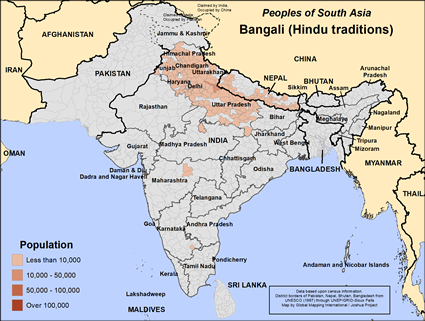Bangali (Hindu traditions) in Nepal

Photo Source:
Copyrighted © 2026
Isudas All rights reserved. Used with permission |

Map Source:
People Group data: Omid. Map geography: UNESCO / GMI. Map Design: Joshua Project.
|
| People Name: | Bangali (Hindu traditions) |
| Country: | Nepal |
| 10/40 Window: | Yes |
| Population: | 27,000 |
| World Population: | 101,000 |
| Primary Language: | Maithili |
| Primary Religion: | Hinduism |
| Christian Adherents: | 0.54 % |
| Evangelicals: | 0.00 % |
| Scripture: | New Testament |
| Ministry Resources: | Yes |
| Jesus Film: | Yes |
| Audio Recordings: | Yes |
| People Cluster: | South Asia Dalit - other |
| Affinity Bloc: | South Asian Peoples |
| Progress Level: |
|
Introduction / History
The Bangali are a semi-nomadic tribal people who live in north India and Nepal. They are distinct from the large Bengali people who live in northeast India and Bangladesh.
The Bangali make their living by charming snakes, working as landless farm workers, in animal husbandry and by gathering forest products like roots. The Nepali government has made an effort to stop their wandering ways and make them live in fixed villages. Most Bangali cannot read or write. They are among the poorest peoples of Nepal.
The main language of the Bangali is Maithili Smaller groups speak Bengali and Nepali.
Where Are they Located?
Most Bangali live in north India and the Nepali states of Kosi, Mechi, Bagmati and Lumbini.
What Are Their Lives Like?
The Bangali live a subsistence existence in Nepali. They travel from place to place raising their animals and trying to find day labor jobs so they can feed their families.
They sell their animals to buy food and other necessary items. They live in portable huts made of reeds and mud.
The Bangali marry within their group. Families arrange marriages. Sons inherit what little property the father possesses. Since their traditional occupation of snake charming is disappearing more and more Bangali are working as day agricultural laborers. If these jobs are few, the Bangali face the prospect of starvation.
The Nepali government disapproves of their hunting animals and gathering products from the forest so that source of food is almost gone.
Caste councils settle legal disputes and promote their interests with outsiders.
The Bangali are not vegetarians but will not eat beef. Meat is normally reserved for holidays. The main foods of the Bangali are rice, wheat, lentils and vegetables.
What Are Their Beliefs?
The Nepali Bangali practice Hinduism, the ancient religion of the Indian subcontinent. They mix their Hindu faith with folk religion. They worship and serve the gods of the Hindu pantheon. Each clan may have their patron deities. Hindus believe that by performing rituals and good works that they will attain moksha or freedom from the endless cycle of birth, death and rebirth. The Bangali visit Hindu temples and shrines and offer prayers, food, flowers and incense to their gods. There are many forms of Hinduism, each with its own deities and beliefs.
The main yearly holidays of the Bangali people are Holi, the festival of colors, Diwali, the festival of lights, Navratri, the celebration of autumn and Rama Navami, Rama's birthday.
What Are Their Needs?
The Bangali have tremendous spiritual and physical needs. They need help in establishing permanent villages. They need help in learning new job skills and in educating their children. They would benefit by having access to clean water, electricity and modern medical care. Most of all the Bangali need to hear about Jesus Christ.
Prayer Points
Pray that the Bangali caste councils and leaders come to Jesus Christ and lead their families to Christ.
Pray that God will give them a distain for their Hindu gods and a strong desire to know the Triune God of the Bible.
Pray that God will send them believers who can help them escape their spiritual and physical poverty.